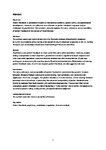Is collecting patient feedback 'a futile exercise' in the context of recertification?
| dc.contributor.author | Baines, Rebecca | |
| dc.contributor.author | Zahra, Daniel | |
| dc.contributor.author | Bryce, Marie | |
| dc.contributor.author | Regan de Bere, Sam | |
| dc.contributor.author | Roberts, Martin | |
| dc.contributor.author | Archer, Julian | |
| dc.date.accessioned | 2019-07-11T09:26:23Z | |
| dc.date.issued | 2019-12 | |
| dc.identifier.issn | 1042-9670 | |
| dc.identifier.issn | 1545-7230 | |
| dc.identifier.uri | http://hdl.handle.net/10026.1/14625 | |
| dc.description.abstract |
OBJECTIVE: Patient feedback is considered integral to maintaining excellence, patient safety, and professional development. However, the collection of and reflection on patient feedback may pose unique challenges for psychiatrists. This research uniquely explores the value, relevance, and acceptability of patient feedback in the context of recertification. METHODS: The authors conducted statistical and inductive thematic analyses of psychiatrist responses (n = 1761) to a national census survey of all doctors (n = 26,171) licensed to practice in the UK. Activity theory was also used to develop a theoretical understanding of the issues identified. RESULTS: Psychiatrists rate patient feedback as more useful than some other specialties. However, despite asking a comparable number of patients, psychiatrists receive a significantly lower response rate than most other specialties. Inductive thematic analysis identified six key themes: (1) job role, setting, and environment; (2) reporting issues; (3) administrative barriers; (4) limitations of existing patient feedback tools; (5) attitudes towards patient feedback; and (6) suggested solutions. CONCLUSIONS: The value, relevance, and acceptability of patient feedback are undermined by systemic tensions between division of labor, community understanding, tool complexity, and restrictive rule application. This is not to suggest that patient feedback is "a futile exercise." Rather, existing feedback processes should be refined. In particular, the value and acceptability of patient feedback tools should be explored both from a patient and professional perspective. If issues identified remain unresolved, patient feedback is at risk of becoming a "futile exercise" that is denied the opportunity to enhance patient safety, quality of care, and professional development. | |
| dc.format.extent | 570-576 | |
| dc.format.medium | Print-Electronic | |
| dc.language | en | |
| dc.language.iso | en | |
| dc.publisher | Springer (part of Springer Nature) | |
| dc.subject | Patient feedback | |
| dc.subject | Psychiatry | |
| dc.subject | Revalidation | |
| dc.subject | Regulation | |
| dc.subject | Thematic analysis | |
| dc.title | Is collecting patient feedback 'a futile exercise' in the context of recertification? | |
| dc.type | journal-article | |
| dc.type | Journal Article | |
| plymouth.author-url | https://www.webofscience.com/api/gateway?GWVersion=2&SrcApp=PARTNER_APP&SrcAuth=LinksAMR&KeyUT=WOS:000511685000003&DestLinkType=FullRecord&DestApp=ALL_WOS&UsrCustomerID=11bb513d99f797142bcfeffcc58ea008 | |
| plymouth.issue | 6 | |
| plymouth.volume | 43 | |
| plymouth.publication-status | Published | |
| plymouth.journal | Academic Psychiatry | |
| dc.identifier.doi | 10.1007/s40596-019-01088-w | |
| plymouth.organisational-group | /Plymouth | |
| plymouth.organisational-group | /Plymouth/Faculty of Health | |
| plymouth.organisational-group | /Plymouth/Faculty of Health/Peninsula Medical School | |
| plymouth.organisational-group | /Plymouth/REF 2021 Researchers by UoA | |
| plymouth.organisational-group | /Plymouth/REF 2021 Researchers by UoA/UoA23 Education | |
| plymouth.organisational-group | /Plymouth/Research Groups | |
| plymouth.organisational-group | /Plymouth/Research Groups/Institute of Health and Community | |
| plymouth.organisational-group | /Plymouth/Research Groups/Plymouth Institute of Health and Care Research (PIHR) | |
| plymouth.organisational-group | /Plymouth/Users by role | |
| plymouth.organisational-group | /Plymouth/Users by role/Academics | |
| dc.publisher.place | United States | |
| dcterms.dateAccepted | 2019-06-25 | |
| dc.rights.embargodate | 2020-7-14 | |
| dc.identifier.eissn | 1545-7230 | |
| dc.rights.embargoperiod | Not known | |
| rioxxterms.versionofrecord | 10.1007/s40596-019-01088-w | |
| rioxxterms.licenseref.uri | http://www.rioxx.net/licenses/all-rights-reserved | |
| rioxxterms.type | Journal Article/Review |


